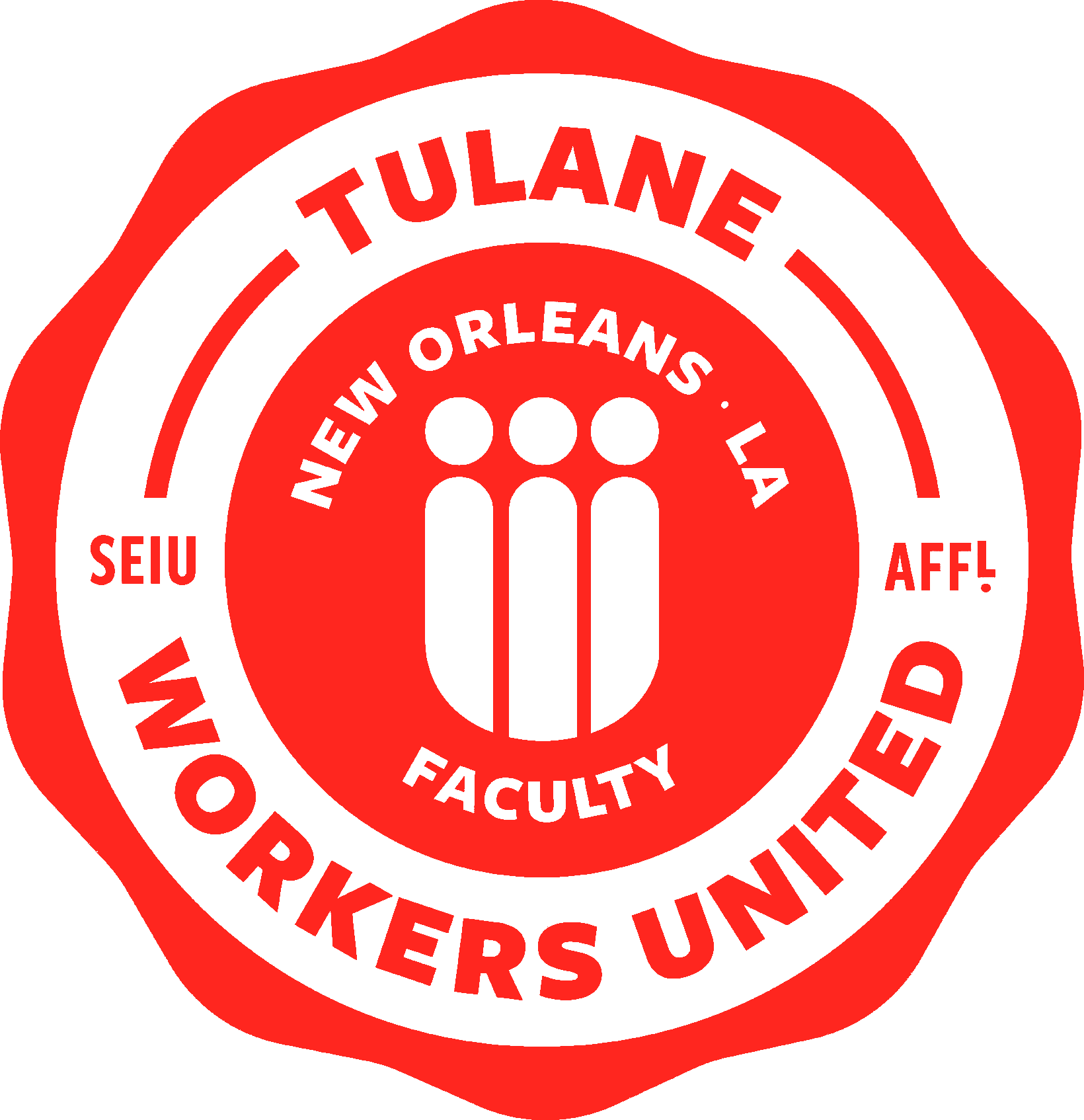Building the Tulane Workers United Bargaining Team
We are now opening bargaining to our entire membership! As you may already know, open and transparent bargaining has been our goal since day one, and our first few bargaining sessions have given us a good deal of information about how best to achieve this goal. Over the past few weeks, our elected bargaining representatives and at large members have developed a plan for expanded bargaining participation, which this newsletter will outline.
But first, we want to update you on the bargaining process itself. Over the past year, not only have we formed a union, but we have brought Tulane to the bargaining table and have made progress on our first collective bargaining agreement. Let us say that again. For the first time in the history of this institution, Tulane faculty have brought our employer to the bargaining table—and within just a few bargaining sessions have already made progress on our first collective bargaining agreement. It’s difficult to understate what a profoundly big deal this is. We’ve already won some important tentative agreements around our collective bargaining contract language that will protect us, enhance the strength of our contract, and allow us to maintain the kind of transparency and openness that makes our union strong. Be on the lookout for meeting invites where you can learn more details—or reach out directly to members of the bargaining team.
Our bargaining sessions have also taught us something important: When we bring more people to the table, the energy of negotiations shifts palpably in our favor. Because our bargaining team is made up of faculty (with, as we all know, hectic schedules), it hasn’t always been possible for our entire team to attend a given bargaining session. While this is something we anticipated, we did not anticipate how dramatically things could change in our favor when our entire bargaining team is in the room. Physical presence matters—and this is just one of the reasons that expanding bargaining participation is so important.
TWU’S EXPANDED BARGAINING PLAN
We’re expanding bargaining participation both to demonstrate our power as faculty and as a way for our membership to become directly involved in the bargaining process. While our 15-person elected structure will remain in place—and those elected representatives will still function as our frontline in bargaining sessions—all sessions will now be open to all trained members. This is an opportunity for our members not only to have a direct impact on bargaining, but also to learn a bit more about how collective bargaining works. To attend and to participate in bargaining sessions, members will need to fulfill a few simple requirements.
First, attend a training session: Over the coming weeks and months, we will host a number of bargaining training sessions. These 90-minute training sessions will introduce you to the basic process of collective bargaining. Once you’ve completed a training, you will be eligible to attend any future bargaining sessions you choose.
Second, RSVP: As bargaining sessions are scheduled, we’ll send out an announcement with an RSVP form for any trained members who would like to attend. If you wish to attend a given session, simply RSVP by the required deadline. There may also be opportunities to become more involved, and we’ll talk about those in the training session.
Third, observe or participate in the bargaining session: You’ll have the opportunity to observe bargaining or, if you’re interested, to fill in for any of our elected members who cannot attend the session. While our legal team does most of the talking at the table, serving as a substitute will mean participating in caucus discussions throughout the bargaining session.
Simple, right? We sincerely hope that all of our members will choose to attend a training and at least one bargaining session. The time commitment is completely up to you, and you are welcome to participate at whatever level you feel most comfortable. In the end, the best way to learn about collective bargaining or to have an impact on the process is joining us in the room.
SIGN UP FOR A BARGAINING TRAINING
To get this process started, we’ve scheduled a number of training dates, and these sessions will be open to anyone who has completed training and submitted an RSVP. Of course, if you have any questions, don’t hesitate to reach out. Find the available training date and a sign up link below.
Sign up for bargaining training here.
Our Bargaining Team
| Becky Otten | Centers | Social Innovation | PoP |
| Borja Gama de Cossio | SLA | Spanish & Portuguese | PoP |
| Brian McNamara | SOPA | Public Administration | PoP (Assoc. Director of Public Administration Program) |
| Brooke Grant | SOPA | Education | Senior PoP |
| Chris Oliver | SLA | Sociology | Senior PoP |
| Chris Otten | Freeman | Business & Legal Studies | PoP |
| Ebony Perro | SLA | English/First Year Writing | Senior PoP |
| Heather Veneziano | Architecture | Historic Preservation | PoP (Assoc. Director of Historic Presservation) |
| James Cronin | SSE | Cell & Molecular Biology | Senior PoP |
| Kelly Tierney | Architecture | Design | VAP |
| Matt Toups | SSE | Computer Science | PoP |
| Tyler Antrup | Architecture | Real Estate | VAP |
| Lourdes Rincon | SLA | Spanish & Portuguese | Instructor |
